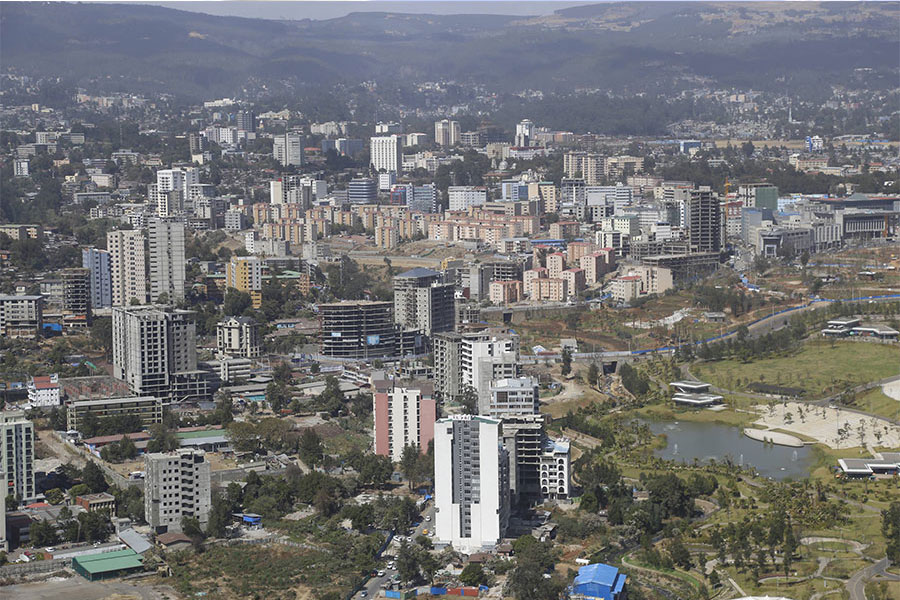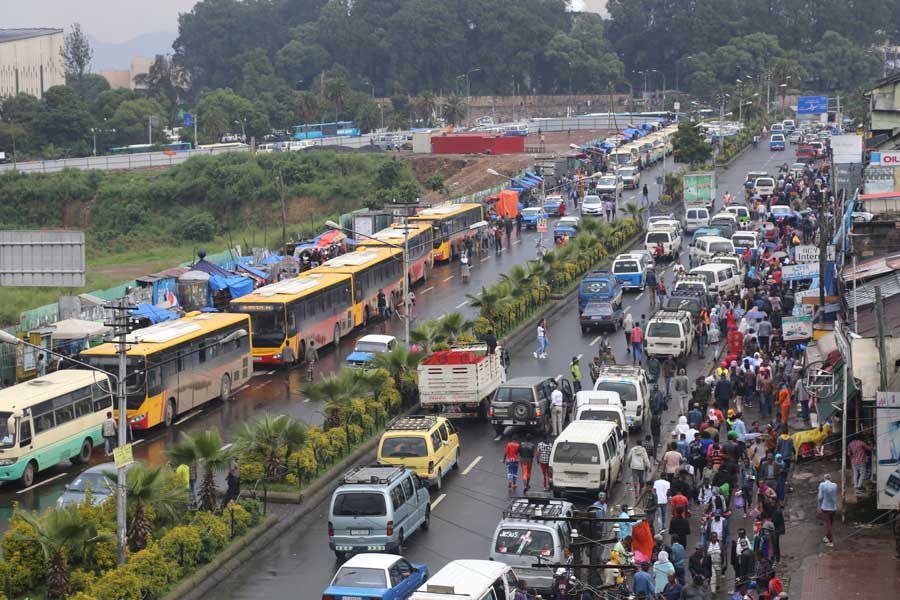
Third-wheeled vehicles, locally referred to as 'Bajaj', will soon be banished from main roads if officials from the Addis Abeba Transport Bureau and the Ministry of Transport & Logistics push a bill to pass the federal legislative floor.
The bill will set tariffs, limiting their carrying capacity to three people and offering them fuel subsidies. It will restrict their movement to areas designated by the Addis Abeba Transport Bureau, which has registered close to 6,100 'Bajajs' in the last six months. The Communications Director, Etsegenet Abebe, noted that even with the vast numbers of registration, it is difficult to identify precisely how many roam the streets.
Bajaj drivers were enraged and voiced fears during their animated engagement with officials from the Bureau. The latter tried to persuade them that the bill is part of a national strategy by the Ministry to promote mass transportation modalities and reduce causes of road congestion.
A shortage of vehicles and long queues at public transport terminals is common in the capital, with over 2.7 million residents dependent on the public transport system. The Bureau deploys no less than 8,000 minibuses and nearly 1,500 buses, including 425 operated by Sheger Mass Transportation Services Enterprise. The Anbessa City Bus Services Enterprise runs a fleet of 650 buses.
According to Etsegenet, the bill was necessary with growing crime reports and a tendency to overload their seat capacity with as many as six passengers.
"It has become inescapable," Etsegenet told Fortune.
The appeal of fuel subsidies does little to slake the sense of doom felt by most owners and drivers.
Getasew Abebe, 26, is from Gojam, 299Km from the capital, in Amhara Regional State, driving Bajaj. After failing his 10th-grade national exam five years ago, he started to make a living by providing a 'Bajaj' transport service. He saved up 200,000 Br to buy the three-wheeled vehicle after three years of working as a daily labourer, now contemplating the idea of returning home in frustration, with debilitating anxiety expressed on his face.
"If carts are allowed to carry more people, I might as well buy a horse," he said as he exhaled, leaning onto his prized possession.
The drivers claim to experience harassment by traffic police officers and road transport personnel while the proposed bill is under the legislative grail. According to the drivers, the detour which lies outside the main roads, where they are being pushed towards, is exclusive to members of associations. Becoming a member of these associations needs unofficial payments that go as high as 200,000 Br, which most cannot afford.
Birhanu Ayew, 30, with a diploma in management, has been driving the three-wheeled vehicles after four years of unemployment.
"I'm going to sell it," he yelled, pointing to his beat-up blue 'bajaj'.
Drivers charge as high as 30 Br for a passenger in some parts of the capital carrying five people. Birhanu feels the proposed three and five Birr tariffs while putting a carrying cap of three-person is "unacceptable."
Imported mainly from India, the three-wheeled vehicles first appeared two decades ago in Dire Dewa. Gradually, they have become a regular sight across urban areas, including Addis Abeba, with the brand 'Bajaj' becoming a popular moniker for three-wheeled vehicles. Data from the former Federal Transport Authority reveals that nearly 170,000 three-wheeled vehicles operate on roads across the country.
A third of these vehicles are registered in the Oromia, followed by the Sidama and South Western regional states. The Oromia Transport Bureau has thus far registered 65,000 three-wheel vehicles under 574 associations, each comprised of up to 400 members.
A similar tale is ensuing 90Km from the capital. Adama town (Nazareth) is known for its overwhelming traffic congestion, mainly from 'Bajajs'.
Hailu Jelil, its mayor, recently warned that the movement of the three-wheeled vehicles would be restricted to selected roads complying with the plan to make Adama a "Smart City", a recent favourite buzzword under the Abiy Administration to justify the move.
Says the Mayor: "Adama is aggressively working on becoming the 'smart and competent city' in East Africa."
According to Adem Seqo, the town's Road & Transport Chief Officer, Adama's routes are divided into three categories. The main roads, locally referred to as first-line roads, are available for taxis, while the cobblestones and tributaries of the main streets are dedicated to third-wheel drives. The third route is for trucks weighing over two tons.
The Unions complained that they were torpedoed at a meeting where the officials told them, before winning concessions, they could not work on the main roads.
"We've not received an official letter," says Fekadu Kebede, head of the Oda Nebe Bajaj Owners' Association.
They told officials to organise and prepare much better routes for the 'Bajajs' to work on as the cobblestones are not convenient for the durability of the tricycles.
According to Getachew Abebe, director of transport supply for the Bureau, the three-wheeled vehicles have been given specific routes in Adama, Jimma, and Shashemene towns, including the ones operating under the Oromia special zones such as Sebeta, Legetafo, Burayu, and Sululta.
Agegnehu Jobir, 28, a father of one, is one of the 'Bajaj' owners. He is a finance agent and drives a bajaj as a part-time job. He said that the Adama City Administration wants to push them out.
He described how the 'smart city' ambition complicates daily routines by forcing them to take longer routes to get to their destination using the designated roads. The extra fuel cost is also a worry for Agegnehu as he buys two litres of fuel for 170 Br from local vendors, which is almost double the price from the stations, for it is not easy to find gas at the stations.
"They don't care about us," he told Fortune.
PUBLISHED ON
Dec 04,2022 [ VOL
23 , NO
1179]

Fortune News | Jun 01,2019

Sunday with Eden | Oct 02,2021

View From Arada | Dec 23,2023

Sunday with Eden | Mar 30,2024

Radar | Jun 22,2024

Fortune News | Feb 20,2019

Fortune News | Dec 09,2023

Covid-19 | Jun 07,2020

Agenda | Jun 12,2021

Fortune News | Mar 02,2019

Dec 22 , 2024 . By TIZITA SHEWAFERAW
Charged with transforming colossal state-owned enterprises into modern and competitiv...

Aug 18 , 2024 . By AKSAH ITALO
Although predictable Yonas Zerihun's job in the ride-hailing service is not immune to...

Jul 28 , 2024 . By TIZITA SHEWAFERAW
Unhabitual, perhaps too many, Samuel Gebreyohannes, 38, used to occasionally enjoy a couple of beers at breakfast. However, he recently swit...

Jul 13 , 2024 . By AKSAH ITALO
Investors who rely on tractors, trucks, and field vehicles for commuting, transporting commodities, and f...

Oct 4 , 2025
Eyob Tekalegn (PhD) had been in the Governor's chair for only weeks when, on Septembe...

Sep 27 , 2025
Four years into an experiment with “shock therapy” in education, the national moo...

Sep 20 , 2025
Getachew Reda's return to the national stage was always going to stir attention. Once...

Sep 13 , 2025
At its launch in Nairobi two years ago, the Africa Climate Summit was billed as the f...